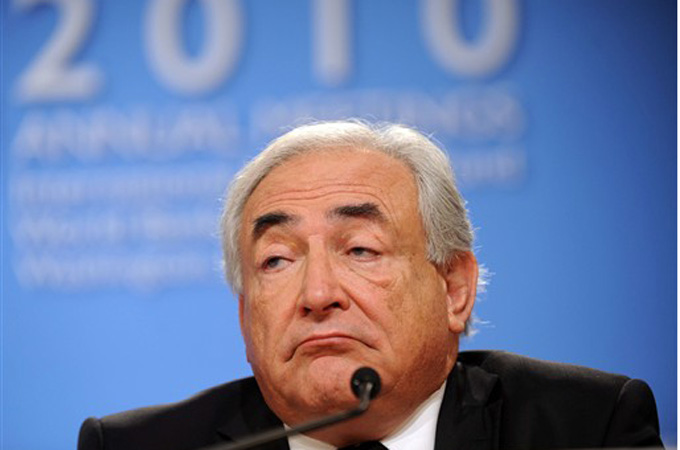Currency wars ‘hurt global markets’
International Monetary Fund and European Union warn nations against undervaluing their currencies.

 |
| Dominique Strauss-Kahn, IMF Managing Director, says re-balancing currencies should be the main goal [AFP] |
Global policymakers clashed over currency policies as Western leaders warned China and other emerging markets that widespread efforts to weaken exchange rates threaten to derail economic recovery.
Officials around the world fear that a rush to undervalue currencies may trigger trade tariffs and other measures that could damage global economic growth.
Keep reading
list of 4 itemsWhy is Germany maintaining economic ties with China?
Behind India’s Manipur conflict: A tale of drugs, armed groups and politics
China’s economy beats expectations, growing 5.3 percent in first quarter
Using exchange rates “as a policy weapon” to undercut other economies and boost a country’s own exporters “would represent a very serious risk to the global recovery,” Dominique Strauss-Kahn, the International Monetary Fund (IMF) director, said ahead of Friday’s twice-yearly IMF meeting.
European officials said on Thursday that a rapidly rising euro, victimised by an undervalued US dollar and Chinese yuan, could threaten eurozone recovery and vowed to press both Washington and Beijing to take action.
European Union leaders contend that the euro – currently at an eight-month high of more than $1.40 – is being squeezed in a transglobal race for trading income.
“The euro is currently bearing a disproportionate burden in the adjustment of the global exchange rate,” a spokesman for Olli Rehn, the European Union Economic Affairs Commissioner, said.
“This may affect recovery of the European economy,” the spokesman stressed, reiterating that the yuan is “still significantly undervalued.”
‘Singled out’
But China, which the West accuses of keeping the yuan artificially weak to promote exports, has rebuffed the criticism.
Al Jazeera’s Melissa Chan, reporting from the Chinese capital of Beijing, said that while China is typically “singled out” as a currency manipulator, within the country, there is an understanding that its economy must move “from an export-driven model to a consumer-based one”.
“But while everyone knows that China has a trade surplus with the United States, few know that China has a trade deficit with countries like Brazil, South Korea and Japan.”
On Wednesday, Premier Wen Jiabao told the European Union to stop piling pressure on Beijing to revalue the yuan, saying a rapid exchange rate shift could unleash disastrous social turmoil in China.
“Many of our exporting companies would have to close down, migrant workers would have to return to their villages,” Wen said during a visit to Brussels. “If China saw social and economic turbulence, then it would be a disaster for the world.”
EU Commissioner Rehn’s spokesman also contended that US currency policies were also troubling the European Union and said the EU would raise the same complaints it did with China on Wednesday “to the Americans, to Geithner too”.
Competitive devaluations
However, Timothy Geithner, the US treasury secretary, continued his attacks on countries with large trade surpluses, saying they must let their currencies rise lest they trigger a devastating round of competitive devaluations.
“When large economies with undervalued exchange rates act to keep the currency from appreciating, that encourages other countries to do the same,” Geithner said on Wednesday, in remarks that appeared aimed at China.
Some economists suspect that it suits the United States to have a weak dollar and a strong euro when the pace of recovery is so dependent on winning the competition for exports with emerging powers such as China, India, Russia or Brazil.
Low interest rates in Europe and Japan and expectation that the Federal Reserve will launch another round of money printing that could weaken the dollar have pushed currencies to the top of the agenda at the IMF meeting and at Friday’s gathering of finance leaders from the Group of 20 economies.
Al Jazeera’s Steve Chao, reporting from Tokyo, Japan, said that while the Yen is seen as a stable investment, “hordes of speculators” have switch to the currency, driving its value up. This, he said, lead to a “rebellion of sorts” as the government had to take unilateral action in manipulating its currency.
“And there lies the vulnerability. Facing major pressure from Japan’s own industries, the Bank of Japan slashed interest rates to zero, and sold off a trillion yen,” our correspondent said.
“That marks the largest one-day currency action ever in this country.”